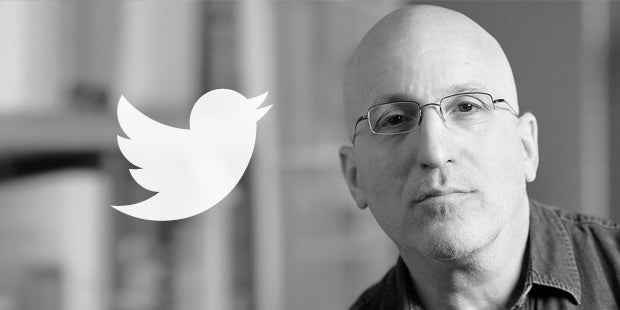Benjamin Dreyer is the copy chief and managing editor of Random House, as well as the bestselling author of Dreyer’s English. Part of his success as an author has come from his engagement with Twitter. Read on to learn from Dreyer how to do Twitter right as an author.
Long before I had any conscious intention of writing a book, one of my wiser colleagues—in marketing, neither incidentally nor irrelevantly—took me aside one afternoon and said, “You need to go on Twitter.”
“Why?” I asked. “I’m not a comedian, and I have nothing to sell.”
“Just,” came the answer, “do it.”
So I did it.
If you’re reading these words, you’ve already attained the conscious intention of writing a book, and then some, and you may be wrestling with the necessity of wading into what some people have been known to refer to, with equal parts affection and disgust, as “that hellsite.”
I can speak only for myself, and my own experiences, but I too exhort you:
Just do it.
But there are ways to do Twitter and ways to do Twitter, and here, succinctly, are my best bits of advice:
• Keep your bio neat, tidy, and up-to-date. Your book is no longer “coming soon” five months after it went on sale. (Do you have a website? Well, link to it right there, for pete’s sake!)
• Tweet as often as you care to, but try not to live on Twitter. (Yeah, I know: Physician, heal thyself, and all that jazz.) On the other hand, whether you’re actively tweeting or not, keep your eyes on your account. You never know when some perfectly innocent remark may cause a minor explosion, and . . . well, be aware.
• Follow, follow, follow. Follow accounts because you like the people running them, and (without being cynical about it, because who likes a cynic?) follow accounts that have followed you first, because, well, it’s a kind and tactful thing to do. Follow other authors, agents, publicists, journalists, booksellers, etc. Copy editors, even. Or even especially. One lovely thing I’ve found in my time on Twitter is that you will meet people—virtually and, possibly eventually, in real life—you might otherwise never have met, or even known about. Remember: People want to know about you, they want to like you and your book, and they may well want to help get your book out into the world in ways you couldn’t possibly have imagined. That said, you can’t follow back everyone in the world, and everyone in the world should be able to understand that.
• Be responsive. You can’t necessarily respond to everyone who says something nice to you, but it’s a small thing to hit the like button. And you know what’s a good thing to do when responding to someone? Use their name. It turns what might have seemed a generic response into a personal communication, and I think that people truly appreciate it.
• Don’t brawl. Ninety-seven times out of a hundred—maybe even a hundred and two times out of a hundred—I regret losing my temper and responding in kind to someone who’s said something to me that’s snippy, condescending, or downright hostile. The urge to hit back is often almost irresistible, but frosty politeness—or, really, no response at all—will likely leave you feeling better at the end of the day. (OK, sure, there are any number of people I like on Twitter who have made it their life’s mission to drag their detractors to hell and back, but good gosh that takes a lot of energy.)
• Make friends with the mute button. There are some people whose wannabe bon mots you never need to hear again as long as you or they live. And there will be people whose adoration for you and your work may spill over into Annie Wilkes possessiveness. You don’t have to become BFFs with someone who gives you the shivers, and that’s why God invented the mute button. (Also: Learn to soft-block. Trust me.)
• Blow your own horn. You’re not on Twitter for your health. If you get a glowing review, tweet it. If a follower’s said something really lovely to you about your work, retweet it. (Pace yourself, to be sure. At a certain point, respectable self-promotion can spill over into spamming, and you don’t want to become one of those oh-no-not-them-again tweeters.)
• And speaking of blowing your own horn . . . Once your book is prepurchasable, make good use of the PRH.com link to it, which will lead book buyers not only to the online behemoths we know and, um, love but also to the independent booksellers who, hopefully, will adore and boost you as much as if not more than your own mother. (Preorders and first-week sales are crucial to the life and success of your book, and there’s zero shame in reminding your potential readers of that.)
• Be a whole person. Somewhere between Garbo-like privacy and manic oversharing lies a sweet spot. People who like you will like to know a little bit about you that’s not author-oriented. Lord knows everyone on Twitter likes to talk about what they just ate, often with photos. Pets are fun too. (Yes, I’m well aware that some days my dog is a lot more popular than I am. She’s aware of it too, which has led to some interesting conversations with my agent and a “chew-toy clause.”) The occasional vacation snap. What you thought of last night’s episode of Succession. (I can’t necessarily guide you about the supremely personal stuff, especially the sad stuff; you’ll work that out for yourself.)
And finally:
• Be you. Try to be on Twitter the person you are IRL, as the young folk say. It’s easier to remember.
See you on the hellsite!
Benjamin Dreyer is Vice President, Executive Managing Editor and Copy Chief, of Random House. You can follow him on Twitter at @BCDreyer.


